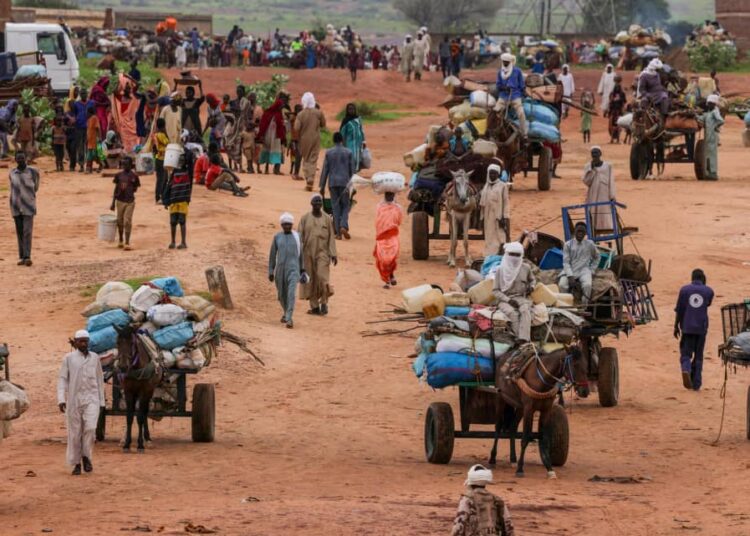The arrival of Sudan’s newly appointed Prime Minister, Kamal Idris, at Port Sudan airport comes amid a turbulent political climate and an increasingly fraught landscape in eastern Sudan. Here, military factions, Islamist movements, and armed groups collide in a feverish contest over power and wealth, particularly the ministries of Finance and Minerals.
Idris’s appointment marks a critical juncture for the military regime that has ruled the country since General Abdel Fattah Al-Burhan’s coup in October 2021, which ousted the civilian-led transitional government. Since then, Al-Burhan has leaned on a fragile coalition made up of remnants of the former regime, radical Islamist battalions, and signatories of the Juba Peace Agreement. Yet this alliance of convenience is visibly fraying, with fissures widening at every new political test.
A Government Without Vision, A Atruggle Gor Spoils:
While Idris’s appointment is being framed as a step toward “broadening the civilian base,” many observers view the upcoming Port Sudan government as devoid of reformist vision, merely a reshuffling of opportunistic figures handpicked to distribute positions among entrenched military and Islamist power centers.
Idris himself is a controversial figure, having traversed a wide ideological spectrum – from the Communist Party to the Democratic Front, then the Socialist Union – before aligning with Islamists and running against Omar Al-Bashir in the 2010 elections with their support. He later denounced them as “criminals” during the 2018 revolution. Now, he returns to the spotlight, backed discreetly by a faction within the ruling regime, serving as a civilian façade without real authority.
Behind the scenes, powerful interests within the junta are vying for control of sovereign ministries – most notably Finance and Minerals – given their strategic value in economic dominance and resource control.
Ministry Of Minerals: Gold Amid A Sea Of Blood:
The Ministry of Minerals has become the epicenter of this rivalry, as gold remains Sudan’s primary source of foreign currency following the collapse of oil revenues. Official figures indicate that prior to the war, Sudan produced between 120 and 200 tons of gold annually, ranking third in Africa after South Africa and Ghana.
With the expansion of artisanal mining and the proliferation of private companies in the sector, control over this ministry effectively grants access to one of the state’s largest treasuries in a nation ravaged by conflict and lacking central oversight.
Armed movements, such as the Sudan Liberation Movement led by Minni Arko Minnawi and the Justice and Equality Movement under Gibril Ibrahim, have made no secret of their determination to retain control of this key portfolio, which they consider one of the chief gains of the Juba Peace Agreement. However, sources close to Al-Burhan and factions within the Islamist camp are maneuvering to sideline these groups, aiming to replace them with technocrats loyal to the military establishment.
Islamists On Edge:
Islamists, meanwhile, have voiced growing alarm over Idris’s appointment, with some describing it as a betrayal. In a widely circulated video, Islamist leader Al-Naji Abdullah denounced the decision, branding Idris a continuation of the “Forces of Freedom and Change” alliance and accusing him of hostility toward the military. He even hinted at a conspiracy to remove Islamist cadres from the political arena.
This backlash reflects a deepening sense of insecurity within the Islamist movement, which increasingly views Al-Burhan as an unreliable ally. Scholar and commentator Dr. Al-Nour Hamad likens the relationship to a “cat-and-mouse game,” arguing that Al-Burhan exploits the Islamists when convenient, then discards them when expedient. He cited the dissolution of the Popular Mobilization Committee in Gedaref as part of a quiet campaign to dismantle Islamist paramilitary arms.
Journalist Alaa Al-Din Bashir echoes this sentiment, noting that “Islamists have lost most of their manpower in the war and gained little politically, while the military leadership now holds the reins and fears the Islamists’ ambition to fully reclaim power.” While Al-Burhan has historical ties to the Islamists, Bashir adds, he is under pressure from regional and international actors – especially Washington – to distance himself from them, though he has yet to sever ties entirely.
A government treading a minefield
Political analyst Jaafar Mansour Al-Majdoub describes the Port Sudan government as “a product of delicate balances and conflicting interests,” rather than a reflection of a cohesive national project. He suggests that Kamal Idris appears to be a civilian cover for an entirely military regime, as the ongoing conflict only exacerbates Sudan’s political and humanitarian crises.
Al-Majdoub argues that Idris’s emphasis on “consensus” and “national interest” rings hollow in a context that demands bold, transformative decisions, such as dismantling Islamist networks and curbing the military’s grip on the economy. Yet Idris lacks both the power and the will to pursue such reforms, making him a pawn in the hands of contending power brokers.
In essence, the appointment of Kamal Idris does not signal the beginning of a genuine political transition. Rather, it reveals the fragmentation within Sudan’s ruling coalition. The ongoing contest between Al-Burhan’s faction, the Islamists, and the armed movements is not driven by principles but by a scramble for spoils. Ministries like the Ministry of Minerals and the Ministry of Finance have become proxy battlegrounds in a broader struggle for influence in a nation steadily unraveling under the weight of internal war.
In the absence of a coherent national vision, and amid the persistence of factional calculations and regional power plays, Sudan appears headed toward deeper fragmentation, held together only by the ruling factions’ shared fear of mutual collapse.
* Culled from Horn of Africa Studies Center.






